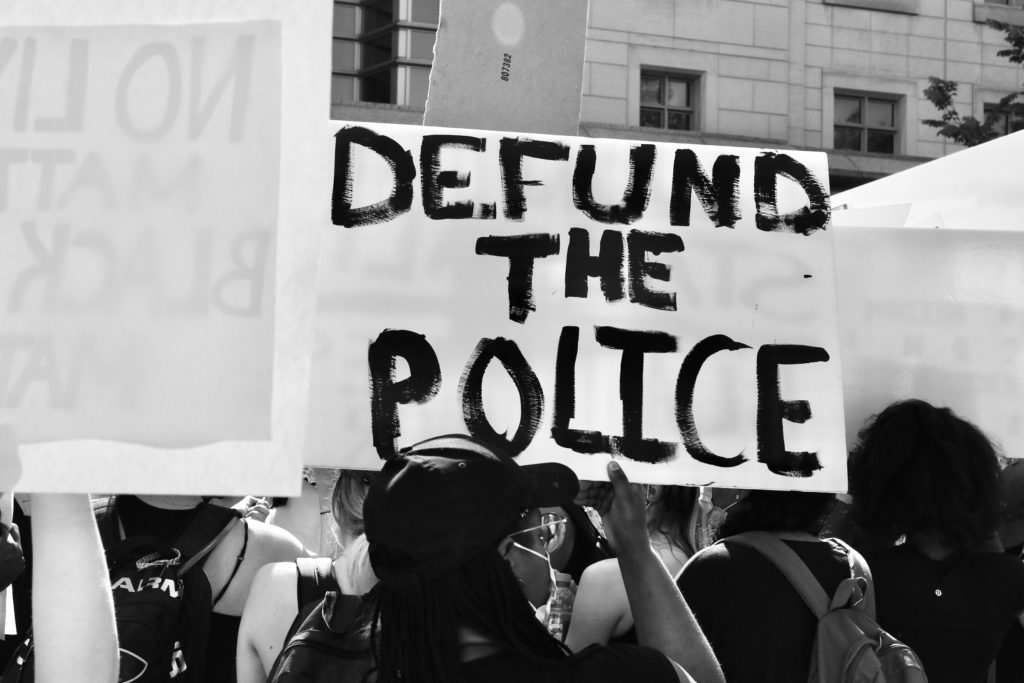COVID-19, Racist Violence and Defunding the Police
United Church of Christ – Wider Church Ministries
Humanitarian Development Team
Coronavirus (COVID-19) Daily Briefing
Barbara T. Baylor, MPH – Temporary Health Liaison
COVID-19, Racist Violence and Defunding the Police
As protesters across the country call for meaningful action to address police brutality and systemic racism in the United States, the movement to defund the police is growing because many feel that police have gotten away with committing violence against Black people for decades.
Deep frustration at the unabated police violence; high unemployment, and the deadliest infectious disease in a century has burst into the streets in worldwide protests, riots and violence. Many are calling for action to redirect resources from policing to healthcare, education, housing, jobs and true community safety.
The murder of George Floyd by a police officer who knelt on his neck for nearly nine minutes, along with countless other such deliberate deaths, have been a painful reminder of law enforcement’s failure to fulfill its proclaimed goal to “serve and protect.”
According to Freedom Inc., one of the organizations coordinating the daily demonstrations in Minnesota, systemic violence and police oppression can be traced to the days of slavery, when it was legal to enslave people and legal for police to return those who escaped to their owners. Law enforcement allowed decades of lynching. Civil rights leaders were murdered. And now African Americans are dying needlessly at the hands of police officers.
The concept of defunding law enforcement is rooted in the idea of eliminating funds for policing and redirecting that money to initiatives that directly serve communities.
Usually, to “defund” something means to strip it of its funding entirely. It is a misconception that “defunding” used in this context means stripping the police of all their funding. In this case recent mainstream proposals to “defund” the police are actually just calling for their budgets to be pared down and for city and state municipalities to reinvest and redirect monies to directly serve communities.
It’s also important to note that defunding is different from reforming, which advocates say has largely been ineffective. You can learn more about the differences between defunding and reforming through Critical Resistance, a national grassroots organization working to abolish policing, imprisonment and surveillance.
Over the past 30 years, police budgets have ballooned in American cities, with Forbes reporting that the United States spends more than $100 billion on policing per year. For many major cities, police department budgets make up a disproportionate amount of overall spending, even as other departments face steep cuts amid the COVID-19 pandemic.
In the years since the Sept. 11, 2001, terror attacks in particular, the massive cash influx has gone towards creating an increasingly militarized police force. Officers tote military-grade weapons and drive armored vehicles, thanks in large part to a military-to-police equipment pipeline. Police budgets have been getting bigger and policing has been getting harsher.
Jamani Montague of Critical Resistance says the driving goal of defunding is to abolish the current system of policing and justice as we know it and replace it with “transformative justice,” a political framework and approach for responding to violence, harm and abuse. At its most basic, it seeks to respond to violence without creating more violence. What’s more, it seeks to engage people in harm reduction to lessen the violence.
Black Lives Matter co-founder Patrisse Cullors told WBUR, “It’s not possible for the entity of law enforcement to be a compassionate, caring governmental agency in Black communities.” She stands firm in her belief that more training is not the answer. Training has borne evidence that the culture of law enforcement is “incapable of changing,” Cullors says, adding that the time has come for the public to demand that local officials “defund the police” to “defend Black lives.”
If you want to get involved, Black Lives Matter suggests the following actions:
- Sign the #DefundThePolice petition at Black Lives Matter.
- Vote “no” on all increases to police budgets.
- Vote “yes” to decrease police spending and budgets.
- Vote “yes” to increase spending on healthcare, education and community programs that keep Black communities nationwide safe.
In addition, the following actions are recommended by Change.org in partnership with Atlanta, Ga.. Mayor Keisha Lance-Bottoms:
- Research how much of your city’s budget goes toward police and lobby your lawmakers to reallocate that spending toward healthcare, education, and housing. Attend your local city council meetings to be part of the conversation on the budget. The Leadership Conference on Civil and Human Rights has created a toolkit with resources and information for how to get involved.
- Advocate against new attempts to keep your city and county from constructing new jails. Demand they reallocate funds toward housing, mental health, ending homelessness and other such initiatives.
Systemic changes are needed to address structural racism – including allocation of funds to end health inequities, especially when the United States is leading the world in the number of confirmed COVID-19 cases, affecting communities of color disproportionately..
that requires everyone to come together to fight racism.”
Wisconsin’s Gov. Tony Evers
Other References:
Why Protesters Want to Defund Police Departments
The End of Policing: a Free EBook (click on the Ebook tab)
Start a petition of your own
This petition starter stood up and acted. Will you do the same?
COVID-19 Puts Structural Racism on Full Display – Will We Finally Do Something to Correct It?
Related News
Growing Weary
In December 1964 during a speech in Harlem, Fannie Lou Hamer declared: “And you can always...
Read MorePlanning for Earth Month: Resources for Congregations
April is Earth Month, and for congregations, it can be a great time to further discern how...
Read MoreBodily Autonomy Means Every-BODY
Advocacy and Action for Women's and Gender Justice Local events stir thoughts and...
Read More


